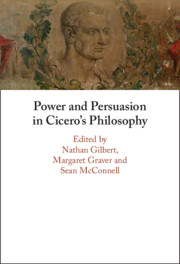Book contents
- Power and Persuasion in Cicero’s Philosophy
- Power and Persuasion in Cicero’s Philosophy
- Copyright page
- Contents
- Contributors
- Note on Texts and Translations
- Introduction
- Part I Techniques and Tactics of Ciceronian Philosophy
- Part II Political Philosophy and Ethics
- Chapter 6 Iuris consensu Revisited
- Chapter 7 The Psychology of Honor in Cicero’s De re publica
- Chapter 8 Cicero on the Justice of War
- Chapter 9 Towards a Definition of Sapientia
- Chapter 10 Old Men in Cicero’s Political Philosophy
- References
- Index Locorum
- General Index
Chapter 9 - Towards a Definition of Sapientia
Philosophy in Cicero’s Pro Marcello
from Part II - Political Philosophy and Ethics
Published online by Cambridge University Press: 15 January 2023
- Power and Persuasion in Cicero’s Philosophy
- Power and Persuasion in Cicero’s Philosophy
- Copyright page
- Contents
- Contributors
- Note on Texts and Translations
- Introduction
- Part I Techniques and Tactics of Ciceronian Philosophy
- Part II Political Philosophy and Ethics
- Chapter 6 Iuris consensu Revisited
- Chapter 7 The Psychology of Honor in Cicero’s De re publica
- Chapter 8 Cicero on the Justice of War
- Chapter 9 Towards a Definition of Sapientia
- Chapter 10 Old Men in Cicero’s Political Philosophy
- References
- Index Locorum
- General Index
Summary
This chapter examines Cicero’s Pro Marcello of 46 bce, a speech of thanksgiving to Julius Caesar for pardoning his civil-war for M. Claudius Marcellus. I argue that Cicero cleverly uses philosophical arguments to, as it were, entrap Caesar into working towards the restoration of the Republic. Philosophical wisdom is a leitmotif of the speech, and Caesar in particular is called sapiens or associated with sapientia nine times. The basic argument that underlies Pro Marcello, without ever being made explicit, is the following syllogism: The wise man will act virtuously. Caesar is a wise man. Therefore, Caesar will act virtuously. In defining what acting virtuously would mean for his addressee, Cicero argues vigorously against Caesar’s own statement that he had already ‘lived enough for either nature or glory’ (satis diu uel naturae uixi uel gloriae, 25), painting the dictator as an Epicurean whose wrong ideas about both virtue and glory the orator seeks to combat.
- Type
- Chapter
- Information
- Power and Persuasion in Cicero's Philosophy , pp. 205 - 217Publisher: Cambridge University PressPrint publication year: 2023

